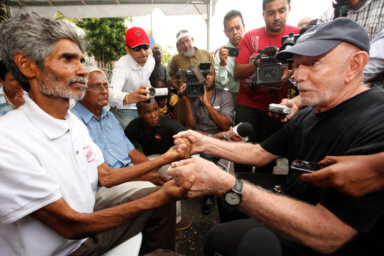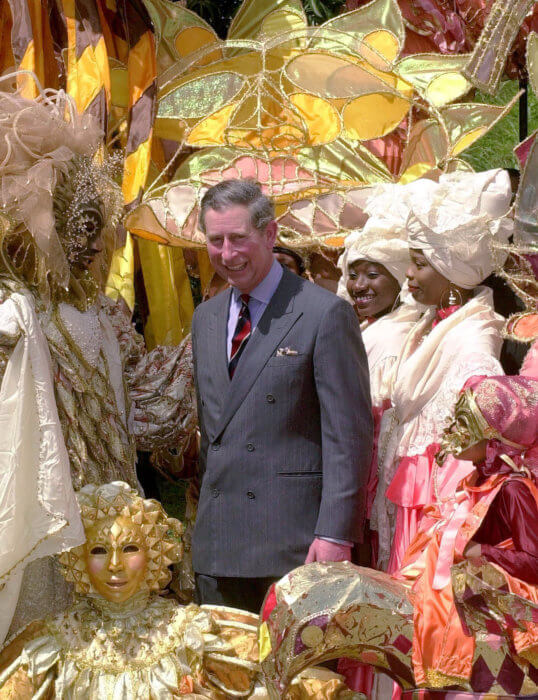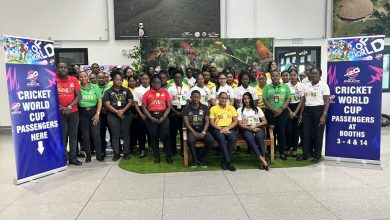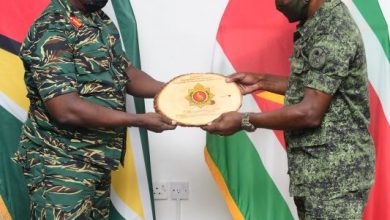A Decade with Minshall

Why does the world need a book that explores the contemporary works of mas by Peter Minshall in the Carnival of Trinidad and Tobago? This is a valid query, that may be more useful than a Venn diagram that estimates the audience size for such a book.
The book that chronicles the entire design career of Emmy®–winning artist Peter Minshall came close to being realized. I was a contributor to the Atlanta Journal–Constitution newspaper and a correspondent for Black Enterprise magazine when the invitation to submit photography arrived in 2004. I shipped off a collection of 35mm slides that happened to span the 1990s. In early 2007, that collection of photographs was returned along with four proofsheets. The ambitious book project, sponsored by the Prince Claus Fund, had collapsed.
A career in photojournalism poached me from Essence magazine and planted me in Trinidad. Soon, fate organized a chance meeting for my curiosity and camera. Instead of feasting in the Caribbean ritual of Sunday lunch, I committed Sundays to documenting Minshall’s process of grooming mas performers in his Callaloo Company theatre workshops. Nearly three decades later, that collection of rare portraits from 1992 complements the history captured in a first–of–its–kind limited edition titled “The Last Mas.” This volume has been accepted into the peer review process of a university press in the U.S.
The writer Patricia Ganase observes, “during the 1990s Trinidad and Tobago was of particular interest to academics from overseas,” many of whom were researching for a thesis or book. In Trinidad and Tobago, the 1990s opened with shocking news of the Jamaat al Muslimeen–led insurrection in the capital city, then cricketer Brian Lara scored his first world record. Harvesting natural gas continued to bankroll the GDP, and Wendy Fitzwilliam crowned Trinidad and Tobago with its second Miss Universe win. In the midst of those moments, pioneering mas designer Peter Minshall positioned the Carnival arts center stage at the Olympic Games—twice.

The idea to produce a chapbook — a publication formed from one chapter—is anchored by that collection of photography that was returned. It blossomed in dimension when Mrs. Ganase sourced two accomplished academics who invested in researching Minshall during the 1990s. Eventually, several other scholars crossed our radar.
Minshall’s thought–provoking mas band narratives reflect and examine the realities of Trinidad and Tobago society in that moment of time; they are historical records. Generations of academics would be at a disadvantage, if the wealth of knowledge and talents that produced such magnificent works of performance art was not intellectually surveyed and archived in book form.
The goal is not just to produce a pretty object to adorn coffee tables. This collaboration assembles thought leaders in the arts and academics, whose unique experience in Minshall’s world during the 1990s stimulates creative and critical analysis. Generous support from First Citizens, the Minshall Mas Foundation, and Ministry of Community Development, Culture and the Arts under Dr. Nyan Gadsby–Dolly, recognizes the immense inspiration this book will provide to generations. But the work of securing corporate sponsorship is not done.
Minshall offered his blessing to this book and provided an eloquent composition to support a pictorial. Then days after his 2020 Band of the Year win for Mas Pieta, he recorded an interview.
Along with the insightful and provocative interrogations presented in The Last Mas by scholars at Cornell University, Trinity College, and the City University of New York, researchers will be compelled to contemplate observations by Philip W. Scher, a professor of anthropology and folklore at the University of Oregon. He writes, “Minshall’s Hallelujah trilogy, although casting its thematic net globally and universally, still reflected issues of contention within Trinidad. For instance: the uneasy balance between secularism, spirituality and religious tolerance, the unspoken issues of class, the postcolonial condition of identity in relation not just to England and the United States, but Jamaica, Barbados and the Caribbean as a whole.”
The Last Mas does not intend to be the definitive book on Peter Minshall in the Carnival of Trinidad and Tobago, but with your support it will expand interest and open the door for other books that celebrate the brilliance of T&T Carnival.





